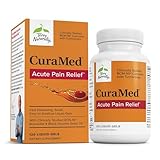Standard medical advice when someone has acute back pain is to take non-steroidal anti-inflammatory drugs (NSAID) like ibuprofen (Motrin™, Advil™) and diclofenac (Voltaren™). New research says that may cause more harm than good.
The new study adds new information on how the body works and how acute pain can become chronic pain (pain for more than three months). The results showed that taking NSAIDS for acute muscle pain may be counter-productive and lead to chronic pain. Science Translational Medicine published the study in May 2022.
The Research
The research analyzed transcriptomic genes produced by neutrophils, a type of white blood cell, from the blood of subjects with resolved and chronic low back pain. The presence of transcriptomic genes indicates that repair processes are ongoing.
Patients with resolved pain have more than 1,700 genes differentially expressed than those with persistent pain. According to the author, this suggests
Subjects who resolved pain over time have an abundance of active biological processes underlying recovery and these processes are partially driven by changes in blood cell composition.
Another set of patients in their study with acute and persistent temporomandibular disorder (TMD) have the same findings in their blood. TMD is a pain in the jaw joint, and that finding is significant since the mechanism of pain in TMD is different from low back pain.
To test if their theory works. Rodents on NSAIDs with chronic pain were injected with neutrophils. After getting the neutrophils, the pain went away. That confirmed that the presence of neutrophils facilitates muscle repair to relieve prolonged pain.
What explains that?
Pain is a warning symptom so that the activity that provoked the pain will be avoided. At the same time, the body part that hurts will be used less often to facilitate the repair.
An acute muscular injury needs repair, and neutrophils are one of the first responders to begin the reconstructive process. In reconstruction, inflammation and repair must happen; during that time, substances needed for healing can also cause pain.
Clinical confirmation
To confirm the results, they searched the UK Biobank. The UK Biobank is a repository of biomedical information of half a million people. It contains medical histories, blood work, imaging like x-rays, CT scans, MRI, eating and exercise habits, and medication history. Its primary use is for medical research.
Their search in the UK Biobank showed that patients who took NSAIDS have an elevated risk of chronic pain.

Other Analgesics that can prolong pain
It is not only the NSAIDS that can prolong the pain. Common prescription medications for back pain are steroids, and examples are Prednisone™, dexamethasone, methylprednisolone, or Medrol Dose Pack™.
Pain killers that don’t prevent repair
The good news is that other pain killers in the study did not prevent the healing process. Acetaminophen, also known as paracetamol, antidepressants, gabapentin, morphine, and lidocaine used for pain control, do not inhibit the repair process.
NSAID users have a 1.76-fold greater risk of developing chronic back pain than with other pain killers. That finding is constant when they adjusted for age, sex and ethnicity.
In summary, the research shows NSAID use (but no other analgesic class) increases the risk of subsequent development of chronic back pain.
The authors suggest that clinical trials should be conducted on humans. It is time to reconsider how acute pain is treated.
Here is a list of NSAIDs from Rxlist.
- aspirin,
- salsalate (Amigesic)
- celecoxib (Celebrex),
- diclofenac (Voltaren),
- etodolac (Lodine),
- ibuprofen (Motrin),
- indomethacin (Indocin),
- ketoprofen (Orudis),
- ketorolac (Toradol),
- nabumetone (Relafen),
- naproxen (Aleve, Naprosyn),
- oxaprozin (Daypro),
- piroxicam (Feldene),
- sulindac (Clinoril), and
- tolmetin (Tolectin).
Don’t Get Sick!
Stay current by subscribing. Feel free to share and like.
Please consider donating to show your support if you find value in this website.
Related:
- The effects of kettlebell exercises for women 65 and older
- Physical Activity Correlates with Life Span
- Humanin, Longer Life Span and How to Have More of Both
- Make that Game Winning Shot that at the Buzzer!
- Physical Activity Correlates with Life Span
- How Does Exercise Prolong Life?
- The Benefits of Resistance Training
- The Surprising Benefits of Sweating
- The Good and Faithful Servant
- Effect of Short Term Exercise on Mortality
- Exercise Guidelines
- Why do You Need an Excellent Performance Status?
- Myokines: An Introduction
- What are Exerkines?
Reference:
Parisien M et al. Acute inflammatory response via neutrophil activation protects against the development of chronic pain. Sci Transl Med. 2022 May 11;14(644):eabj9954. doi: 10.1126/scitranslmed.abj9954. Epub 2022 May 11. PMID: 35544595.
© 2018 – 2022 Asclepiades Medicine, L.L.C. All Rights Reserved
DrJesseSantiano.com does not provide medical advice, diagnosis, or treatment
As an Amazon Associate, I earn from qualifying purchases.
Clinical Pain Management : Acute Pain: Acute Pain
87% OffDiscover more from Don't Get Sick!
Subscribe to get the latest posts sent to your email.



















